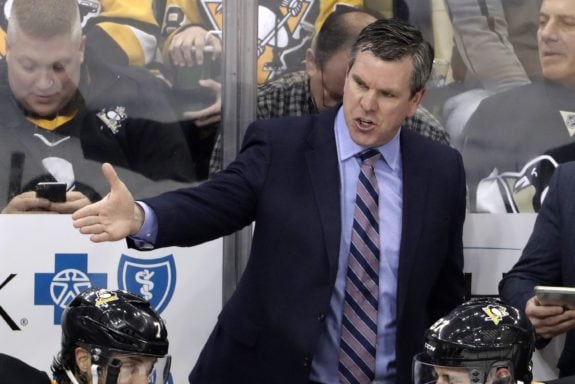First of all, full credit must be given to the Montreal Canadiens. They were the 24th and final team allowed to compete in the Stanley Cup playoffs and finished the season with a record of 31-31-9 for a total of 71 points. Their opponent was the seventh-ranked Pittsburgh Penguins who finished with a record of 40-23-6 record good for 86 points. They entered the postseason loaded with plenty of experience from their 2016 and 2017 Stanley Cup championships.
Related: One for the Ages: Les Binkley’s 1967-68 NHL Season
Very few die-hard Montreal fans even gave their team a chance to win the series and were instead dreaming of their one-in-eight opportunity to land the No. 1 draft pick and get Quebecois Alexis Lafreniere in that classic Montreal sweater.

Once the puck was dropped in Game 1, the reality was different than anyone could have foreseen. Paced by outstanding goaltending from Carey Price and a team coached by veteran Claude Julien, this team gained confidence with each shift. In less than a week, Montreal upset Pittsburgh 3-1 in the qualifying round, and the Penguins players were unhooking the video game systems and heading home from the bubble wondering what happened.
For all that the Canadiens did right to pull the upset, Pittsburgh did just as much wrong and should have never lost this series. Here are the three primary reasons the Penguins were their own biggest enemy in the series loss to Montreal:
Never Found Their Rhythm
For a team that experienced as much success in recent years as this Penguins team, the thought of facing the 24th-ranked Canadiens was viewed as little more than a tune-up. With thoughts of potential matchups with teams like Boston, Washington, and even in-state rival Philadelphia on the horizon, this team was never able to find its groove and develop a cohesiveness that could be sustained for an extended playoff run. Throughout the four games played in the series, the Penguins looked like a bunch of random strangers rather than a well-tuned machine ready to roll through what would be five rounds to win this year’s Stanley Cup.

(Amy Irvin / The Hockey Writers)
To be fair, the Penguins did play with several different lineup combinations through trades and call-ups because of a total of 291 man-games missed this season. “We did some pretty good things with the amount of injuries we had throughout the year,” Crosby said. “This is the situation we were faced with. We would have loved a better outcome. But it’s hard to tie it all in. It’s like starting fresh. It’s hard to draw off the season as a whole when there’s a four-month break and you start all over again. I think the year as a whole, we did a lot of good things leading up to this. But this was a whole separate thing and we didn’t play good enough to win.”
Costly Mistakes by a Veteran Team
The Penguins were the experienced team, a team that had been back-to-back Stanley Cup Champions just three seasons ago, yet they were the team that was making the mistakes that you would expect from a young team like Montreal. There were several mistakes made in each of the three losses that became magnified and ripe for second-guessing with an upset of this magnitude.
Related: Penguins’ 13 Seasons of Playoff Memories: Stanley Cup Final
During Game 1, the Penguins lost 3-2 in overtime largely because they only converted on 1 of the 7 power-play opportunities that came their way. Holding off the Penguins early seemed to give Montreal some confidence as they rallied back to outshoot Pittsburgh 29-23 after the first period. Forward Conor Sheary also missed wide left on a penalty shot with 3:03 remaining in the third.

In the pivotal Game 3, the series was tied 1-1 and the Penguins seemed in control. They were cruising in the second period with a 3-1 lead and finally, this looked like what everyone expected in this series.
However, even though Montreal isn’t a team blessed with a lot of offensive talent, they managed to score twice in the final 10 minutes of the second period, and ultimately scored the go-ahead goal by Jeff Petry at 5:33 of the third to take command of the series. Getting three goals early against Price and still finding a way to lose a game is never ideal in a best-of-five series.
Game 4 came and the Penguins faced a win or go home situation. They responded by playing tight, while the Canadiens seized the moment and played with confidence and purpose buoyed by the outstanding goaltending of Price. There was no score late in the third period when Brandon Tanev made a critical mistake by sending a blind pass into the middle inside Pittsburgh’s zone. Montreal’s Paul Bryon picked it off and found Artturi Lehkonen in front, who scored the game’s first goal at 15:49, effectively ending the series and the Penguins’ season.
Mike Sullivan was Out-Coached in This Series
Mike Sullivan has been very successful as head coach of the Penguins, winning two Stanley Cups. However, during this whole series, they played timid as if afraid to make a mistake while the underdog Canadiens seemed to be at times the faster and a more inspired team. During the course of the series, where several older veterans were underperforming, Sullivan refused to make key lineup changes that could have helped inject some youth and aggressiveness into this aging team.

(AP Photo/Gene J. Puskar)
The special teams, notably the power play (which went 3-for-17), were very underwhelming in the series, especially with several talented options at Sullivan’s disposal. On the other bench, Julien had his squad motivated, playing hard and being the team that was tough to play against – the very thing the Penguins sought to be going into the 2019-20 season.
Many were excited about the Penguins’ chances this playoff run, as the NHL-mandated 142-day coronavirus pause allowed veterans like Sidney Crosby, Evgeni Malkin, and many others to rest and have fresh legs going into a playoff series. In a span of four games, they have become a franchise searching for answers, as they now have lost 9 of 10 postseason contests, going back to when they defeated the Washington Capitals 3-1 in Game 4 of the Eastern Conference Second Round on May 3, 2018.